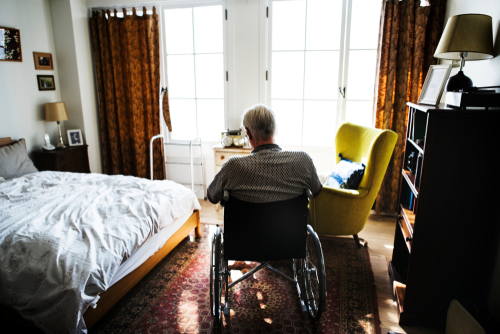Family members concerned about the well-being of a loved one who resides in a nursing home may find themselves wondering just what pressure ulcers are, what causes bedsores, and how skin breakdown can be prevented in a nursing facility.
Pressure ulcers, commonly called bed sores or pressure sores and also known as decubitus ulcers, are sores that develop on the skin. As the name suggests, pressure ulcers are the result of prolonged hard pressure against the skin. This pressure inhibits the flow of oxygen-carrying blood to the skin, causing it to break down and an ulcer to form.
Pressure ulcers are known as bed sores because they often develop after a person has spent extended periods of time immobilized in bed. Since residents of nursing homes and long-term care facilities often have limited mobility and spend prolonged periods in bed or sitting in wheelchairs, the risk for bed sores for them increases. Typically areas of bony prominences develop pressure sores, including the sacrum, hips, heels, elbows, shoulder blades, and more.
Understanding what causes bedsores is important. Pressure ulcers can be minor at the outset, but if they are not addressed, the sores can worsen, leading to infections that can penetrate to the bone or even to internal organs. The progression of pressure sores from surface sores to acute wounds is assessed according to four stages of bed sore deterioration:
- Stage I – This is the stage at which bed sores first emerge. Approximately the size of a quarter, a Stage I ulcer is surface-deep and pink or red in color. Depending upon the surrounding tissue, the pressure sore can be either warm or cool to the touch and can be itchy or slightly painful. At this stage the skin has not broken down and underlying tissue and muscle are not impacted by the sore. Pressure ulcers at this stage can heal quickly if they are detected and remedied immediately.
- Stage II – These more serious pressure sores have been allowed to progress without intervention. Larger in diameter than Stage I pressure ulcers, these bed sores tend to blister and sometimes to burst or wear away the skin. Stage II pressure sores also have deepened, impacting not only the epidermis, but the underlying layer of skin (dermis) as well. The painful, open wound created by stage II pressure ulcers exposes underlying tissue and muscle to potential infection.
- Stage III –At this stage, pressure sores are deeper and very painful. Stage III pressure ulcers also face a new and dangerous development: the skin tissue in around the wound begins to die and decay. This tissue death, known as skin necrosis, makes Stage III bed sores extremely difficult to heal. At this level, pressure sores are especially prone to further deterioration.
- Stage IV – This most serious and extremely painful stage of bedsores is characterized not only by large-scale tissue damage and ulcers that are considerably large and deep (often reaching muscle or even bone), but also by the prevalence of foul-smelling necrotic tissue. In Stage IV the sores typically are discolored and infected; pus and discharge is commonly found. At this stage, pressure ulcers can result in death.
Certain risk factors contribute to the development and the deterioration of pressure sores, including poor hygiene and malnutrition. Health conditions within a nursing home can also be a contributing factor. Ultimately, the cause and exacerbation of bed sores is unalleviated pressure resulting from allowing an individual to remain immobile for prolonged periods of time. Since pressure ulcers are almost always preventable, the top cause of bedsores is nursing home neglect.
When nursing home staff takes prescribed measures—such as turning or repositioning residents who are bed-ridden or immobilized in a wheelchair—pressure sores can be avoided.
A Pressure Ulcer Attorney Who Holds Nursing Homes Accountable
Every bed sore, whatever the stage, is a sign of nursing home neglect. If your loved one who resides at a Philadelphia / PA or NJ nursing home has developed a pressure ulcer at any stage or if you need to understand what causes bedsores, you should contact bed sore attorney Brian P. Murphy. A nursing home abuse and neglect lawyer familiar with the legal responsibilities of nursing home staff in preventing bed sores, Brian has encountered several pressure ulcer nursing home cases in Pennsylvania, Philadelphia, and New Jersey nursing homes. For more information on bed sores and nursing homes, or to discover your legal rights and options, don’t hesitate to contact Brian P. Murphy today.







